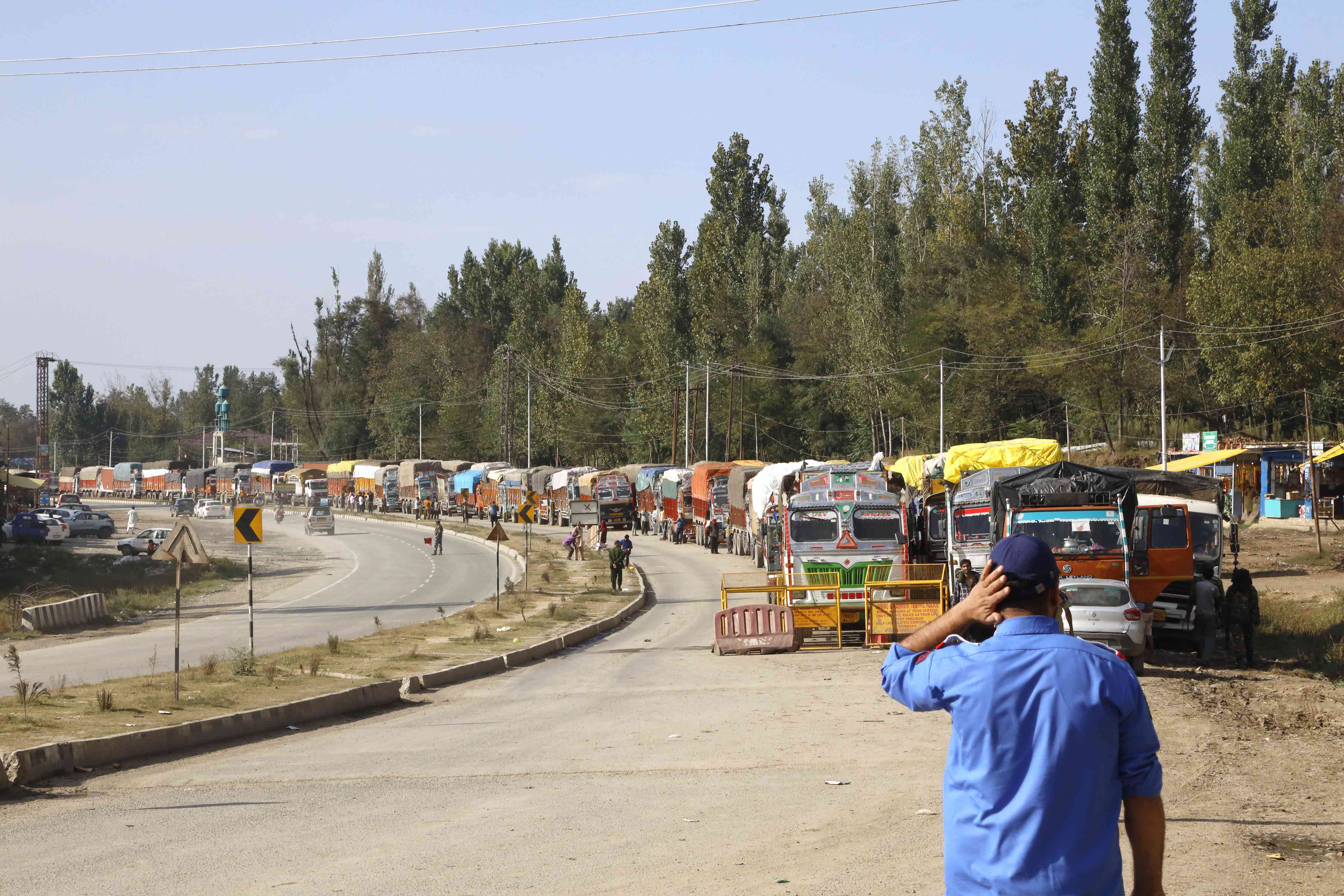
The orchardists suffered as apple-laden trucks were left stranded on the Jammu-Srinagar highway for days on end resulting in rotting of a large portion of the crop. The halt dealt a blow to the apple growers already struggling to keep their heads above water, writes Riyaz Wani
Kashmir has witnessed a bumper apple crop this year but despite that farmers have found themselves struggling to make a profit. A considerable portion of the crop rotted this year due to transportation issues after apple-laden trucks were halted on the Jammu-Srinagar highway for days on end in September and early October.
At one point in September, around 8000 trucks were stranded on the highway carrying apples worth Rs 8000 crore. Road repairs along the highway halted thousands of trucks carrying apple produce to the markets in other parts of the country. This triggered protests by apple farmers who feared that further delay would perish the produce.
The issue also took a political turn with the former Jammu and Kashmir Chief Minister and the PDP chief Mehbooba Mufti joining orchardists to protest the extended closure of the highway. She termed it an “economic terrorism.”
The apple produce touched 2.1 million metric tonnes of apple in Kashmir this year, according to a statement by the divisional commissioner Pandurang K Pole.
Other challenges
The delay in reaching markets in New Delhi and the other parts is not the only problem bedeviling Kashmiri apple. It faces multiple challenges like price crash, vagaries of weather, lack of cold storage and the competition from imported apples, especially from cheap Iranian apples.
Already, the growing costs of pesticides and transportation have considerably reduced the returns from exports. Till the time apple is harvested, a farmer has to spray pesticides between 10 to 15 times to save crop from scabs and other ailments. This involves a huge cost.
“The returns from the apple crop have been diminishing over the years,” said Basharat Bhat, an orchardist from Sopore, Kashmir’s one of the prominent apple towns. “Costs of spraying pesticides and transportation have gone up manifold. This has eaten into returns.”
Bhat said that over the years pesticides rates increased by almost Rs 1,000 per kilo. The pesticides save the crop from scab, mite, leaf infection, and other diseases. The price of wooden boxes in which apples are packed has also gone up to over Rs 100. Labourers who pick apples from trees charge Rs 800 per day. To top it all, the rising cost of transportation has further raised the cost for orchardists.
“The cost of a Kashmiri apple box goes up to Rs 600,” Bhat said. “And to earn a reasonable profit, a box of apple should fetch us around Rs 1000. But the import of apples from other countries has put further pressure on margins.”.
Though a bumper crop this year should have gone some way to make up the loss, the transportation hitches and consequent rotting of some portion of fruit as well as the price crash has undercut the earnings.
Imported apple
A big factor in the Apple crop’s declining returns is the price crash occasioned by the import of apples. According to the East Fruit Information and Analytics Platform, the volume of apples imported by India has doubled and exceeded 400 metric tons for the first time during 2020-21.
Kashmiri apple has in recent years also faced competition from the imported Iranian apple which growers in Kashmir allege is “illegally” imported into India. Though Kashmir accounts for more than 75 percent of India’s total apple production, the Iranian apple has threatened to further undermine its profitability.

Last year, finance minister Nirmala Sitharaman proposed the imposition of a 35 percent Agriculture Infrastructure and Development Cess in the Union Budget on the apples. However, the cess was not levied on the domestic production of apples.
“It didn’t impact Kashmir apples or for that matter internally produced fruit in any other state,” said Bashir Ahmad Bashir, the president of the Kashmir Fruit Growers Association. “What the government did was to reduce the 50 percent customs duty on apple imports to just 15 percent and impose 35 percent cess that would be used to develop the agriculture infrastructure”.
Bashir added that in actual terms there has been “no increase or decrease” in customs duty on the imported apple.
“In fact, we would have been happy if the cess on imported apples would have been in addition to the earlier 50 percent customs duty. This would have made our apple cheaper and increased its demand,” he said.
So, the government move hasn’t translated into any tangible benefit for Kashmiri apple.
Horticulture which is spread across 1.87 lakh acres of land employs more than three million people in Kashmir, earning over Rs 10,000 crore for the region. Over the two years following the revocation of Article 370, the crop suffered the heaviest loss. The security lockdown and communication blockade and later the successive Covid-19 lockdowns and the killings of the traders and labourers associated with the apple industry dealt a body blow to it.
Export prospects?
The growers are hopeful that things will improve going forward. For the first time, Kashmir apples are being exported to Dubai. In 2020, Dubai’s Lulu Group started importing apples from Kashmir and also plans to set up a fruit processing centre in Kashmir.
The UAE-based group, which runs more than 180 hypermarkets and shopping malls across the Middle East, has started importing apples from Kashmir every week from Kashmir. In 2020, around 200 tonnes of apples were exported.
The group will take the Kashmir apple to Middle East countries like UAE, Bahrain, Saudi Arabia, Qatar, Kuwait and Oman. Apart from apples, the Lulu group is also interested in importing saffron, basmati rice, cherries and pulses from Kashmir.
In October 2020, a team of five members of the company spent two days in Kashmir to discuss an investment proposal. The team met representatives of apple and saffron associations, and visited apple orchards and cold stores at Lassipora industrial estate in south Kashmir’s Pulwama district.
The Chief Executive Officer of Fruit Master Agro Fresh Pvt Ltd, Izhan Javed told Tehelka then that his company has signed a Memorandum of understanding with Lulu Group for supply of apples. He said they have been dispatching the consignments of apples to Dubai.
“We hope with the situation in Kashmir improving, things will look up for the apple industry,” said Fayaz Ahmad Malik, president of the Fruit Growers Association of Sopore Mandi. “We also expect the government to proactively look into the issues of the apple industry and remove bottlenecks to ensure a smooth trade.”
The local media has also sought the role of the government in saving the all-important industry.
“It is incumbent on the government to intervene and ensure that the trucks are given a smooth passage. In fact, the government needs to do more to ensure that the apples get a fair price as lakhs of families depend on the trade for their livelihood,” read an editorial in a local daily. “And to that end, hassle-free transportation is critical and the government needs to step in to ensure that everything is done to save the apple trade. The government needs to ensure not only a safe environment and safe passage for the trade but also an effort not to politicize the sector.”













